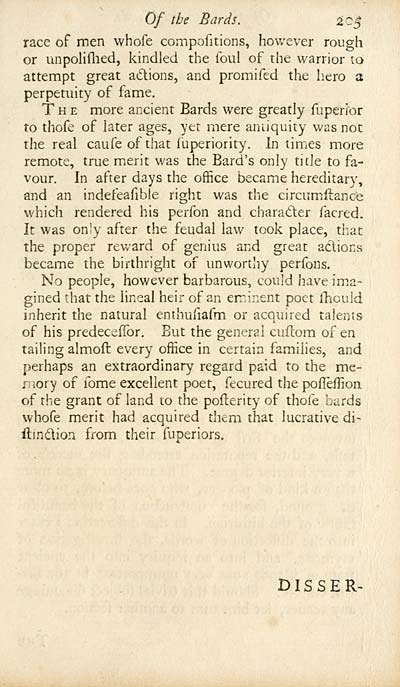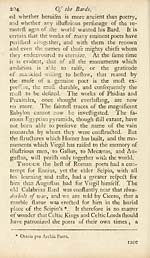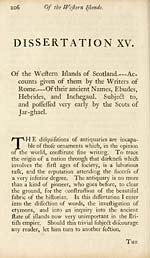Blair Collection > Critical dissertations on the origin, antiquities, language, government, manners, and religion, of the antient Caledonians, their posterity the Picts, and the British and Irish Scots
(243)
Download files
Complete book:
Individual page:
Thumbnail gallery: Grid view | List view

Of the Bards. zc:$
race of men vvhofe compofitions, however rough
or unpoliflied, kindled the foul of the warrior to
attempt great adions, and promifed the Iiero a
perpetuity of fame.
The more ancient Bards were greatly fiiperror
to thofe of later ages, yer mere aniiquity was not
the real caufe of that iuperiority. In limes more
remote, true merit was the Bard's only title to fa-
vour. In after days the office became hereditary,
and an indefeafible right was the circumftance
which rendered his perfon and character facred.
It was only after the feudal law took place, that
the proper rev/ard of genius and great adions
became the birthright of unworthy perfons.
No people, however barbarous, could have ima-
gined that the lineal heir of an eminent poet fhould
inherit the natural enthufiafm or acquired talents
of his predeceffor. But the general cufiom of en
tailing almoft every office in certain families, and
perhaps an extraordinary regard paid to the me-
raory of fome excellent poet, fecured the pofleflion
of the grant of land to the poflerity of thofe bards
whofe merit had acquired them that lucrative di-
ftmdion from their fuperiors.
DISSER-
race of men vvhofe compofitions, however rough
or unpoliflied, kindled the foul of the warrior to
attempt great adions, and promifed the Iiero a
perpetuity of fame.
The more ancient Bards were greatly fiiperror
to thofe of later ages, yer mere aniiquity was not
the real caufe of that iuperiority. In limes more
remote, true merit was the Bard's only title to fa-
vour. In after days the office became hereditary,
and an indefeafible right was the circumftance
which rendered his perfon and character facred.
It was only after the feudal law took place, that
the proper rev/ard of genius and great adions
became the birthright of unworthy perfons.
No people, however barbarous, could have ima-
gined that the lineal heir of an eminent poet fhould
inherit the natural enthufiafm or acquired talents
of his predeceffor. But the general cufiom of en
tailing almoft every office in certain families, and
perhaps an extraordinary regard paid to the me-
raory of fome excellent poet, fecured the pofleflion
of the grant of land to the poflerity of thofe bards
whofe merit had acquired them that lucrative di-
ftmdion from their fuperiors.
DISSER-
Set display mode to: Large image | Transcription
Images and transcriptions on this page, including medium image downloads, may be used under the Creative Commons Attribution 4.0 International Licence unless otherwise stated. ![]()
| Permanent URL | https://digital.nls.uk/76289284 |
|---|
| Description | A selection of books from a collection of more than 500 titles, mostly on religious and literary topics. Also includes some material dealing with other Celtic languages and societies. Collection created towards the end of the 19th century by Lady Evelyn Stewart Murray. |
|---|
| Description | Selected items from five 'Special and Named Printed Collections'. Includes books in Gaelic and other Celtic languages, works about the Gaels, their languages, literature, culture and history. |
|---|

